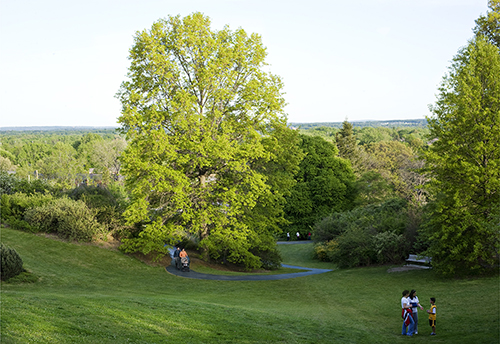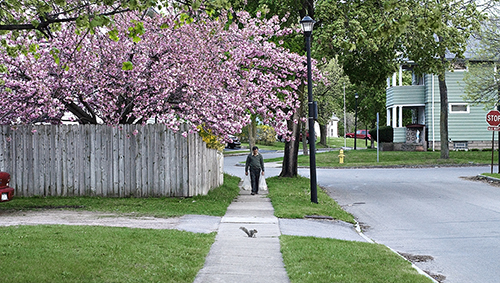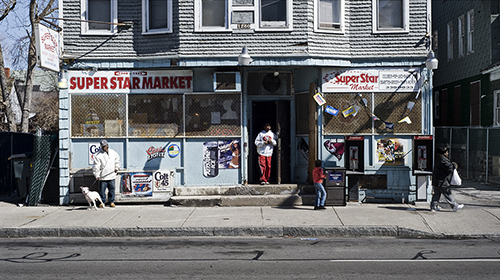Again this week I find myself lucky to have another talented photographer to feature on the blog. It's been several weeks since I first met Greg Jones but via the power of email he was nice enough to answer some of my questions this week. His style and content have a distinguished presentation that led me to want to know more about his work.

[me] It’s been awhile since we last talked about your work, I was wondering could you restate your artist statement here for myself and others reading.
[Greg] You could call these photos my own particular take on street photography, and they're heavily influenced by the Paris/New York street photography from the mid-twentieth century. Rather than capturing the single, "decisive moment" however, these photos are composites of multiple moments of a single scene stitched together into a single frame.
Outside of some contemporary artists like Jeff wall who really focus their work around the tradition of pictoralism, and Crewdson's take on narrative-driven scenes, I look a lot towards old European landscape painters like Claude Lorrain and William Marlow (among many, many others).
Those types of paintings, which show human presence within intimate landscapes and environments, touch on something that I think has become lost in contemporary art. I suppose that something has to do with our experiences in the world, and our interactions within it. Perhaps even a type of sensitivity to our condition on this planet, which is strange when you think about it. Above all else, I think what I'm trying to do is to establish a link with those old paintings to show that at the core of our experience, there really isn't all that much that has changed. You could even say that my method of working, bringing together different points in time, reflects that attitude as well.
[me] Your work contains a tremendous amount of tension in seemingly mundane environments, do you have preconceived ideas about what you would like to see and say, or is your statement on the contemporary landscape a more visceral creation?
[Greg] The photographs themselves are purely visceral. When I'm out shooting, its always just a matter of seeing and reacting. However there are things I'm always looking for, both formally (quality of light, compositional complexity, systems of spacial depth and color) and well as pictorially (character of place, activity within the scene, details). Beyond the photographs themselves, I'm always aware of the type of tradition that I'm working in. Although my methods of working fit more within the more progressive stream of photography, I never feel so far removed from all the Cartier-Bressons and the Todd Webbs in terms of intention and attitude, and those are the types of photographers that I admire.

[me] I constantly hear from people that any given city has a "dying downtown" or is "dead" after the workday, your more "city-esque" pictures seem to echo this pensive conversation, is this a particular sediment of yours or something else entirely?
[Greg] I think that's an interesting reading of the work, but I don't really see it in that vain, and its certainly not what I think about when I'm shooting. While we're on the topic of the city though, I should note that these were all shot in Rochester, NY. I think the tradition of photography in this city has done a lot to influence my work. I even have a photo in the portfolio where you can see the Kodak building in the background.
[me] In contrast, your more rural images seem to have an inherent sadness to them, is this an element I am introducing with my interpretation? Is this something others have noted or not at all?
[Greg] There hasn't been anyone who's specifically noted the inherent sadness that you see, but I certainly wouldn't argue with that. I think all art should invoke some type of emotional response, even the more conceptual based stuff. We're hard-wired to experience things emotionally before we're able to rationalize them. Without being able to feel a work of art, we would never be able to form a meaningful interpretation of it. And this is why craft is important too, because when we find flaws in a work of art, the illusion is broken and that emotional response becomes lost.

[me] Where do you hope to take this work?
[Greg] I've just begun to promote it, and I'm looking to do some gallery shows in the near future. Of course, its still developing, and I continue to surprise myself with the twists and turns that the work takes as it develops. I will have some tough decisions coming up soon in terms of where I'm going to go and exactly what I'm going to do (I'm finishing my B.F.A. in May). Right now I'm considering teaching English abroad for a year or two. I'm looking to find new environments and experiences for both my work and myself.
So there you go. I remember when I first saw the work of Greg Jones. I was really taken by it but I didn't have that much time to get into it and I'm really thankful that I had the opportunity to ask him a few questions that came to mind.
As with all artists I write or interview make sure you stop by their sites a to see more. In the case of, Greg there are quite a few more images on his site and you'll be able to get a better sense of what's going on.
Top quality all around. I just want to mention again, that if you're reading this and have some work you would like to share feel free to contact me and I'll be more than happy to get it out there for you. All you have to do is ask.
As far as today goes...I gotta post and run. Check back later for maybe a post in between here and Music Friday.
Cheers.